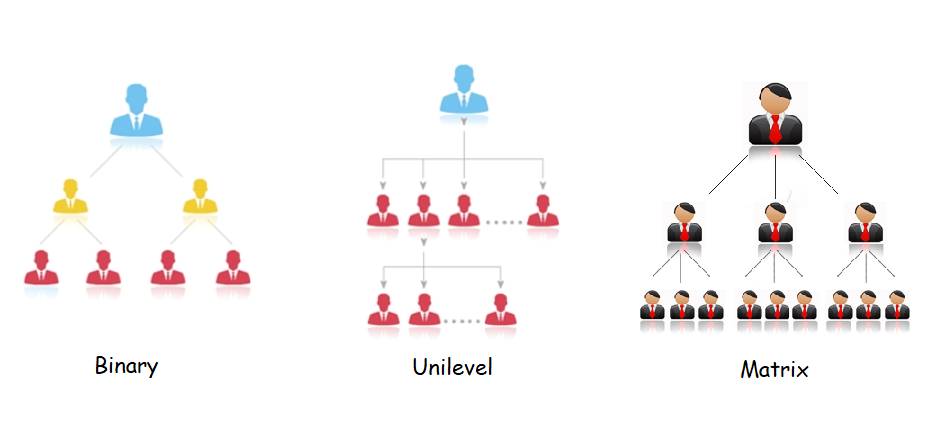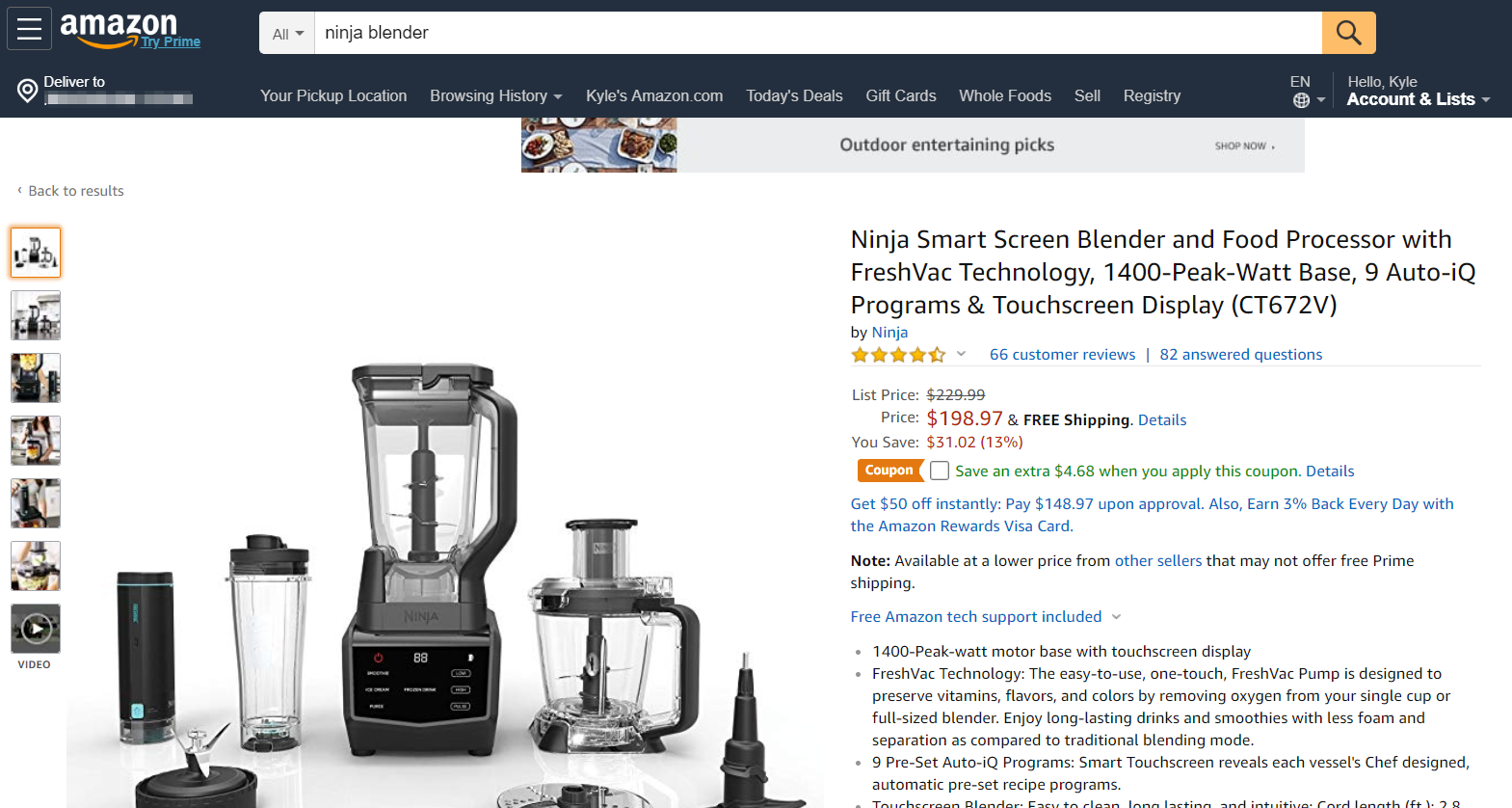Which is a better way to make money, network marketing or affiliate marketing?
It seems like everyone who is involved in network marketing is saying that this is the better option while everyone that is involved in affiliate marketing is telling you that their way is better, so which is it?
Here I'm going to compare network marketing vs affiliate marketing, side-by-side. I'll get in as much detail as possible, hopefully covering everything you need to know so that you have a better understanding of how they match up and which might be a better opportunity for you in particular.
What's best for one person might not necessarily be best for the next person.
I first was introduced to network marketing at a very young age, not by joining myself, but by my stepdad joining more than one different network marketing company, which included Ambit Energy and some other opportunity that sold Acai berry drinks (don't know the name).
I've never actually been personally involved with network marketing opportunities but I have been around them for quite a while and know how they work inside and out. I know the goods and bads of the business along with why they might be a decent opportunity for some people but not so much for others.
When it comes to affiliate marketing I am personally involved. I have actually been affiliate marketing since 2015 and have extensive knowledge in the industry.
So anyways... Now you know little bit about me. Let's get to it…
Both network marketing and affiliate marketing are similar in a lot of ways, yet very different. Start off talking about the similarities…
Similar, Yes... But Very Different
Since you are looking into these types of opportunities you are probably looking for a way to work from home. Both network marketing and affiliate marketing allow you to do so.
Network marketing and affiliate marketing are business models for marketing products where you, the marketer, are part of an independent sales force. It is a good business model for the company because they do not have to worry so much about advertising costs or anything like that. They simply let representatives go out and sell the products for them. And, it is also good for the individual because it creates an opportunity for them to work from home, where one can "write their own paycheck" in a way.
Both network marketing and affiliate marketing are…
- Home business opportunities - You are able to work from home "with" a company rather than "for" a company.
- Flexible - You are your own boss so to speak. This means you can work whenever you want to and make your own schedule. But of course you reap what you sow. Neither opportunity is a chance to slack off and make easy money.
- Low startup costs - Compared to traditional brick and mortar businesses, both of these opportunities have very low startup costs, which is one of the reasons they are so enticing.
- Don't need your own products - Another luring aspect of both of these businesses is that you do not need your own products. You simply join an opportunity and promote the products that they have. This makes starting your own home-based business a lot more easy.
They are very similar in these ways, yet very different. Before we get into how exactly they differ, let's go over in detail what each business model is and how they work... Starting with Network Marketing...
Network Marketing
Network marketing is the same thing as multi-level marketing, or MLM. So I'll be using these two terms interchangeably.
It seems that network marketing was more of the original term and MLM started coming into the picture more as these sorts of opportunities started focusing more and more on recruitment, creating fancy and confusing compensation plans.
But anyways, what is network marketing?
In a nutshell, it is a business model where anyone can join in on the business opportunity as an independent distributor and then create a "network" by recruiting in other members beneath them, into what is called a "downline". The purpose of building a network and recruiting more people in is, of course, to make more money.
Network marketers participate in direct sales, which is when products are sold directly to consumers. There is no need for retail stores or anything of that nature. The network marketer may purchase products at wholesale prices and sell them at a markup price directly to the consumer, or they may have their own replicated company website where they refer people to purchase products.
So there are 2 basic ways to make money: by selling products directly and by recruiting in other members.
You earn money by recruiting in other members because commissions are passed up. So if you were to recruit in Robert, you could earn commissions based on his efforts. And if Robert were to recruit in Joe, both you and Robert would earn commissions from the efforts of Joe. And if Joe were to recruit in Susan then you, Robert, and Joe would all earn commissions from the efforts of Susan selling products and recruiting and people beneath her.
The number of recruit levels that you can earn commissions from varies greatly depending on the company and the particular compensation plan in place. The very structure in which commissions are passed up also varies, but every MLM out there has one of the following 3 basic structures…

As you can see, they all have a pyramid-like shape to them. You recruit in new members and they go beneath you. Then they can recruit in new members and they are placed beneath them, and so on. There is big incentive for everyone to keep recruiting in new members because of how one can earn commissions from building a downline like this.
This is a business model that you sometimes see companies switching to because of how lucrative it can be.
Just think about it for a second… These companies allow the independent sales force of network marketers to deal with all the advertising and promotion. They gladly do this because they are 'incentivized' to do so with the hopes and dreams of earning big money selling products and recruiting other members into their downline.
You often see network marketing opportunity spreading like wildfire because of how much incentive there is to recruit in a bunch of members and build a large team, in which commissions will flow up into your bank account.
Isn't This a Pyramid Scheme?
This looks just like a pyramid scheme doesn't it?
They both have the same basic pyramid-like structures where commissions are passed up to people above, but there is a big difference. The big difference is that pyramid schemes (in their pure form) don't sell any products. They rely solely on the incoming investments of new recruits, as described in an article by the FTC.
Legitimate network marketing opportunities sell real products, AND, much of their revenue comes from sales to the general public.
You often have pyramid schemes disguised as network marketing opportunities in which participants are forced to purchase products. While the revenue in this type of situation is still coming from the sale of legitimate products, it doesn't count because they are forcefully purchased products. Some of these opportunities could also be considered leaning more towards the pyramid scheme side of things when they focus too much on recruitment rather than product sales.
This video does a pretty good job at explaining things:
The reason pyramid schemes are illegal is to protect the public. The way they are set up most people are guaranteed to lose money after joining. That said, the funny thing is that network marketing opportunities aren't much better, if at all. In fact, in a recent comparison post I wrote on MLM and pyramid schemes I talked about a study that found around 99% of people who join network marketing businesses lose money (more on this later).
I know, I know... a shocking revelation.
The Process of Getting Started in Network Marketing:
When it comes to network marketing you really want to do your research before getting involved with a company. Finding a reputable company that sells good products is a must. Remember, you're going to have to do direct selling, which means that you likely are going to have to go out and interact with people face-to-face, trying to sell them on the particular products or the business opportunity.
You also are going to want to look into market saturation. The problem with MLM's is that, because they rely so heavily on recruitment, the more saturated the market becomes the more difficult it is for the independent distributors to make money, since it is more difficult to recruit in new members.
When you first join an opportunity you usually have to purchase some sort of "starter kit" which gives you a range of products that the business sells as well as business materials, such as access to a back office, a replicated website you can send people to for purchasing products, marketing materials, etc.
You might also get some formal training, and often times the person that recruited you into the business will provide you with some training, because of course it is in their best interest since they make commissions based on how well you do.
Pros of Network Marketing
- High income potential - There is plenty of income potential IF you are able to build a large downline.
- Low startup cost - Most MLM opportunities do not cost much to join, although there are some that require very expensive purchases, ranging in the $1000+ range.
- Can earn money from the efforts of others - Much of your business will be focused on recruitment and building a team that you will earn commissions from.
- No special requirements to join - Anyone can join these opportunities as long as they live in the right areas. You don't need any special degrees.
- Flexible - You are your own boss. This is a type of job that you can do in your spare time when starting out, which is one of the reasons these opportunities are so easy to get started with.
- Performance based - You reap what you sow. It's not like some hourly wage job where no matter how hard you work you get paid the same amount.
Cons of Network Marketing
- High turnover rates - MLMs are known for having very high turnover rates and for good reason. I will go into more detail why this is the case in a bit.
- Good chance you will make little to nothing - This goes along with that mentioned above. I will get into more detail on this shortly, but for now just know that there's a good chance you will make little to nothing. Statistics don't lie, asa you will see.
- Have to pay to join - Most opportunities require you to make some sort of purchase in order to join, as mentioned. You might also have to pay on a monthly basis.
- Must be a people person - While some business can be done online, you are definitely going to have to be a people person to be successful with an opportunity like these because face-to-face contact is how most of the business happens.
- Can be annoying - You are going to have to be ruthless when it comes to selling products and recruiting in new members. You more than likely are going to come across as annoying to many people. You will have to get used to this.
- You don't control the products - You have no control over the products. You are simply an independent distributor for the company. They control products.
- Can take a while to get going - You will, without a doubt, have to work for pretty much free when you are starting out. It can take a while to build a customer base, to recruit a sizable amount of people into your team and so on.
Affiliate Marketing
Affiliate marketing is similar to network marketing in some ways. As an affiliate, you are also a part of the independent sales force. You are affiliated with the company but do not actually work "for" them, but rather "with" them.
The basic structure of the business model is that you, the affiliate, earn a commission when you help make a sale. And you ONLY earn commissions from your sales. It is not like MLM where some of your potential earnings are passed up to the people above you. Likewise, you do not earn money from other affiliates and there is no recruiting involved.
*It may seem like a downside that you can earn money from other people's efforts, but it actually isn't. I'll go over undeniable proof of this in a minute.
It is a win/win for both parties (the affiliate and the business) because the business gets more sales and the affiliate earns commissions from the sales. Both parties profit from this sort of collaboration.
Unlike network marketing, affiliate marketing is almost entirely done online. The basic process goes like this…
- You promote products via affiliate links
- Someone clicks on your link and is directed to the seller (Amazon for example)
- They purchase the product
- You get paid a commission
There our tons of different affiliate programs out there, most of them pay percentage commissions. For example, Amazon pays up to 10% commissions and there are others that pay as high as 70 to 80% commissions. It all depends.
Example: You promote an awesome Ninja blender that is available on Amazon. It costs $200 so when someone clicks your link and proceeds to purchase it, Amazon will pay you 10%, which in this case is $20.

I know that isn't much but that is one simple example. Amazon doesn't really pay much and there are plenty of other opportunities out there, some where you can earn commissions of hundreds and even thousands of dollars from one sale.
Direct & Indirect Affiliate Programs
There are many different types of affiliate programs out there, both direct and indirect.
Amazon has the largest affiliate program in the world and theirs is direct, meaning that to join the program you sign up directly through them.
Many other companies don't want to have to deal with all the work of running their own affiliate program, so they outsource the work to an affiliate network, such as Commission Junction, ShareASale, etc.
But it doesn't really matter to the affiliate. Either way you are getting paid the same way, by promoting products and helping make sales. And while you would think that a direct affiliate program might pay higher commissions, since there is no middleman, this doesn't necessarily seem to be the case.
The Process of Getting Started in Affiliate Marketing:
There are lots of different ways you can go about promoting products and earning commissions.
You can promote products through social media, through a YouTube channel, on forums, and so on. What I have found to be most successful, and most people will agree with me here, is promoting products through your own website, which you have complete control of.
Many affiliate programs require you to have your own website anyhow, such as Amazon's affiliate program that I've been talking about. So this it's pretty much a must if you want to get started in this business. And it's not nearly as difficult to create a website as you may think. The Wealthy Affiliate training program makes it simple.
Joining a program, unlike network marketing, requires no purchase. Affiliate programs are completely free to get started with.
Usually you submit an application online and wait for approval. It depends on the program, but this usually does not take long and is a very simple process.
The short video below gives a good explanation as to how this all fits together.
Pros of Affiliate Marketing
- Plenty of income potential - There is plenty of potential, whether you are looking for a part-time income or a full-time income. This is something I personally know because I make a living doing it.
- Low startup cost - The cost differs depending on how you go about it, but overall is extremely low, even when compared to other online business models.
- Free to join affiliate programs - Joining affiliate programs is completely free to do, as mentioned.
- No special requirements to join - Anyone can join affiliate programs regardless of qualifications. There is no need for degrees, certifications, etc.
- Ultimate flexibility - You are your own boss and work when you want, which is the same with MLM. You can get started with even just an hour of spare time a day and potentially turn your affiliate marketing business into more of a central focus.
- Performance based - The same as MLM, you reap what you sow.
- Can work anywhere - This goes along with affiliate marketing providing the ultimate flexibility... You can work literally anywhere with Internet, which is just about anywhere in the world, even in incredibly remote areas.
- Passive income potential - If you are looking to build passive income then the affiliate marketing business model has a lot of potential for you. There are a lot of ways you can automate different processes to earn money again and again from doing something one time. This goes with just about any online business, but affiliate marketing is particularly easy to do it with.
- Lots of products to choose from - Joining affiliate programs is very simple and you are by no means limited. You can promote just about any and every product you can think of.
Cons of Affiliate Marketing
- No guaranteed income - You are considered an independent contractor, and because you reap what you sow, there are no guaranteed earnings.
- Can take a while to get going - Just like MLM, this business model can take a while to get going. You should expect to work pretty much for free in the beginning.
The Main Difference
The big difference between affiliate marketing and network marketing is the pay structure.
With network marketing a large amount of the focus is on recruiting other people in and earning commissions from their efforts. It is true that with a network marketing opportunity you can make money by selling products yourself, but if you do not focus at all on the recruitment side of things, you are probably going to fail.
With affiliate marketing you get paid only from the sales that you personally help make.
Which Sounds Better?
The network marketing opportunity can be very enticing. It sounds awesome that you can make money from the effort of others, by recruiting and building a team beneath you.
HOWEVER, it is not nearly as awesome as it seems.
The pyramid-like structure of a MLM pretty much guarantees failure for most of its participants.
Just think about it for a second... While there is a lot of potential if you make it to the top and are earning a bunch of commissions from people beneath you, the basic structure guarantees that there will always be more people at the bottom than at the top. And these people at the bottom are going to have commissions being sucked away from them and funneled into the pockets of those above them.

This is the big downside of MLM. What appears at first to be an upside is actually more of a downside in my opinion, and the numbers reflect this.
- Tupperware's income disclosure from 2016 shows that 94% of all active participants earned less than $500 in a 10 month span.
- The 2018 income disclosure for Mary Kay distributors states that of the 29,500 distributors in the sales force only around 1,800 made more than $100 for the entire year.
- The 2016 income disclosure statement from World Ventures states that 79.95% of all distributors made no money at all, 5.19% made an average of $245.11, 9.58% made an average of $243.44, and 4.19% earned an average of $1,125.34. Only around 1% of all participants made more than that!
- Arbonne's compensation summary for 2018 shows that 66% of the distributors made an average of $839 for the year, 24% earned an average of $3,851, 6% earned an average of $18,372, 2% earned an average of $71,847 and the top 1% made $260,538. (while still pretty bad, this is actually pretty darn good when it comes to MLMs)
I could go on and on but you get the point. Due to the very structure of a MLM, only the top few percent make much of anything.
There are these things out there called two-tiered affiliate programs, which are affiliate programs that are kinda like MLMs. While they are not technically MLM's, because MLM stands for "multi"-level marketing and there would need to be at least 3 tiers for them to be considered "multi", they are still a lot like a MLM.
I would recommend avoiding two-tiered affiliate programs. With these programs you can get commissions from what you help sell as well as people that join the program through you, which means there is also a recruitment aspect.

These types of affiliate programs are not that common at all however, which is good.
The Winner, and For Good Reason Is..
Affiliate marketing is the clear winner in my opinion. With affiliate marketing you have more freedom to choose products to promote, the startup cost is lower, you don't have any business ties, you can work from anywhere, there is no need to pester family & friends, and the way you earn money is much more straightforward.
1. Promotional Freedom
With affiliate marketing you have a lot more freedom to choose which products you want to promote. With network marketing you are tied to a select few products that the particular business you joined self. With affiliate marketing there are so many more options.
For example, you can join the Amazon affiliate program and instantly have access to promote hundreds of millions of products, and this is just one single affiliate program.
2. Low Startup Cost
The cost of starting out affiliate marketing is about as low as you will possibly find.
With network marketing opportunities the cost varies, but usually you have to purchase some starter kit that can cost hundreds of dollars, sometimes even thousands. You may also be required to pay monthly fees or even purchase a certain amount of products on a monthly basis.
Affiliate marketing programs are free to join.
All you have to worry about is paying for a domain and hosting. A domain will cost you somewhere around $13/yr and hosting can cost you as little as $3-$7/mo. Not too shabby.
However, it can be difficult to get started in you are probably going to want training. I would suggest the Wealthy Affiliate training program. This program is actually free to get started with and even provides you with a free website and hosting so that you can start altogether at no cost.
3. No Business Ties
As I'm writing this I am a member of probably a dozen or so different affiliate programs.
Being an affiliate marketer is very flexible and you in no way have ties to one particular business. If I wanted to, I could drop some of my promotions right this second and start promoting some other similar products. You have a lot of freedom with things like this.
And of course since there is no cost to join affiliate programs, you don't have to purchase anything, and you don't have to worry about unsold inventory or anything like that.
4. Can Work From Anywhere
With network marketing opportunities you have to work in certain countries and, more so, you have to work in areas where you can actually do business. How are you going to sell products if you live in some remote location? Sure, you can do some business online, but with network marketing there is no substitute for face-to-face business.
With affiliate marketing you have just about as much freedom as you can imagine. Whether you are working at your home office in a New York City apartment or on a laptop at the beach, it doesn't really matter. As long as you have Internet you can do the work.
5. No Bugging Friends
As I've mentioned more than once, with affiliate marketing there is no need to recruit (as long as you stay away from 2-tiered affiliate programs). You only get paid for the products that you personally promote. This means that there won't be any bothering family and friends, which you often see with network marketing opportunities (if anyone you know is part of a MLM company you are probably well aware of this).
6. No Confusing Comp Plans
Getting paid as an affiliate marketer is very straightforward. When you help make a sale, you get paid a specified commission.
There are no confusing compensation plans filled with uplines, downlines, quick start bonuses, matching bonuses, this bonus, that bonus, etc., etc. Sure, some affiliate programs to give out bonuses if you do a good job, but MLM's are well known for incredibly confusing comp plans that are made to look way better than they actually are.
The Big Downsides to Know Before Getting Started
High Rates of Failure
Network marketing companies are often forced by the FTC to disclose their distributor earnings. Because of this the statistics are readily available to the general public, so we know how bad these opportunities actually are and how unlikely you are to actually make good money.
However, with affiliate marketing there are not statistics like this to go off of. Being involved in affiliate marketing since 2015 I guarantee that the failure rate is also probably pretty darn high, or at least I would guess so based on my experience and what I've seen.
The difference is that the very structure of a MLM pretty much guarantees failure from most people. With affiliate marketing this is not true.
Working For Free is a Must
No matter which opportunity you join, you must be willing to work for free in the beginning.
You are not getting hired by company and being guaranteed an hourly wage. You are building your own business and this will take time to get going. During this time, much of your efforts might seem like a waste, but they are actually going toward building the foundation which is necessary.
I've mentioned it before earlier on and I will mention it again: If you want the best chances of success with affiliate marketing then I would recommend signing up for the Wealthy Affiliate training program. They offer a free membership for beginners and give you access to the beginners training as well as a free website and other tools to get started.
It's truly a great program and I know this because I have went through it myself.
You can read my full review of Wealthy Affiliate for more info.
I hope this comparison article helped clear the air on a few things and give you a better idea of how these two work-from-home business models stack up against each other.
Take care, and be sure to leave any comments or questions below. I'll get back to you soon 🙂


